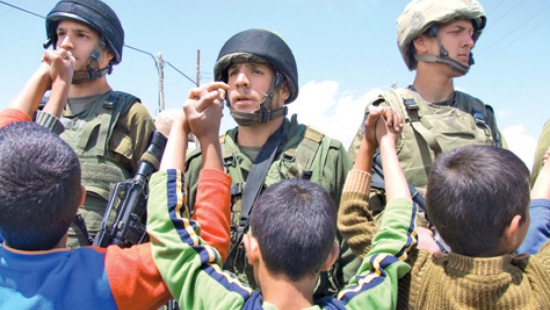Haaretz, Amira Hass: Israel's Once-temporary Occupation Is Now Permanent
The Oslo Accords allow Israel to evade its responsibility for the Palestinian population and pretend to be the side that's being attacked. Israeli border police check Palestinians' identification cards at a checkpoint as they exit the Arab neighborhood of Issawiyeh in Jerusalem, October 22, 2015.AP The ease with which one armed man, who murdered two people, can virtually shut down an entire metropolis for days is already igniting the imaginations of young Palestinians. I was told this earlier in the week by a Palestinian in his 50s after he once again asked, with despairing astonishment, “This crazy government of yours, doesn’t it understand that rule by force can’t last forever?” My interlocutor possessed no intelligence information. He simply used his common sense. And indeed, on Tuesday, we learned about another young Palestinian who vanished in the Herzliya area and announced that he intended to commit an attack. The knowledge that an armed man who has already killed is wandering around somewhere frightens us. It naturally restricts our freedom of movement and creates a feeling of uncertainty about the near future. Excluding the wars and military operations, this is the permanent, normal, unnaturally natural situation of the Palestinians, except that they have no protection. Tel Aviv has proven during these few days that it takes no more than two people being murdered to make others afraid of the armed murderer at large. Yet for many thousands of days, tens of thousands of armed Israelis have aimed and are still aiming tens of thousands of guns at the Palestinian civilian population. For us, this is compulsory military service or reserve duty. For the Palestinians, these are battalions of actual or potential murderers. To his mother in Ra’anana and his sister touring India, the soldier in the Kfir or Givati brigade is a beloved son and brother. To the family in Deheisheh or Hebron whose house he bursts into, he’s the armed man who has already murdered and is indistinguishable from thousands like him, and at any moment, he could return and commit murder. Nevertheless, things were once a little different. “In the 1970s, I would approach a military jeep and throw a rock about this big at the windshield,” my interlocutor said, using his hands to demonstrate the impressive size of the rock. “My school friends did the same thing. We would make the jeep drive in reverse until it reached a point from which others would pelt it with rocks from above. But not one soldier shot at us. Today, we know the soldiers have a license to spray us with 30 or 40 bullets if they merely imagine that someone intends to run over them.” As of Tuesday morning, 86 male and female Palestinians who stabbed Israelis or were suspected of stabbing them or were alleged to have tried to stab them or run over them have been killed by either the security services or armed civilians. Every Palestinian who approaches a group of soldiers or settlers in his car, every Palestinian who puts his hand into his pocket to show his identity card, fears that the armed Israeli opposite him will shoot him and then claim that he had planned to attack. “Because the Shin Bet [security service] has concluded that these are individuals, there’s no cell or organization that it’s interested in uncovering and arresting,” my interlocutor explained. “Therefore, the soldiers have free rein to kill even if their lives aren’t in danger. And Israel thereby saves the cost of an arrest and trial.”
|
hlavní článkynejčtenějšíPalestinci v noci ubránili vesnici před dalším nájezdem osadníků, které agresivně bránila armáda Izraelští extrémisté zaútočili na další dům ve vesnici Duma, kde bylo upáleno dítě 85 Percent of Palestinians killed by Israel were Extra-Judicially Executed |
Kontaktujte nás
Fax: +420 233 552 449



